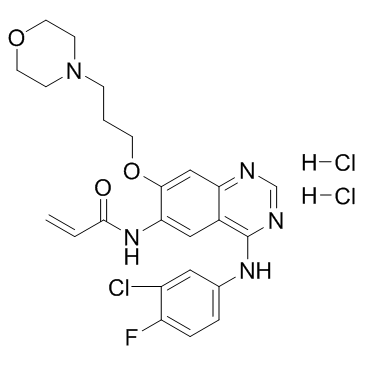The pan-ErbB receptor tyrosine kinase inhibitor canertinib induces ErbB-independent apoptosis in human leukemia (HL-60 and U-937) cells.
Cecilia Trinks, Emelie A Djerf, Anna-Lotta Hallbeck, Jan-Ingvar Jönsson, Thomas M Walz
文献索引:Biochem. Biophys. Res. Commun. 393(1) , 6-10, (2010)
全文:HTML全文
摘要
Epidermal growth factor (EGF) receptor tyrosine kinase inhibitors have recently been shown to display anti-neoplastic effects in human malignant myeloid cells. Our study was initiated in order to determine the effect of the pan-ErbB receptor tyrosine kinase inhibitor, canertinib (CI-1033), on growth and survival of human leukemia (HL-60 and U-937) cells. We show that treatment of HL-60 and U-937 cells with canertinib significantly inhibits growth of both cell lines in a dose-dependent manner; half maximal effective dose (IC(50)) in HL-60 and U-937 cells was approximately 2.5 microM and 1.0 microM, respectively. Treatment with 2 microM canertinib promoted a G(1) cell cycle arrest, whereas doses of 5 microM or more induced apoptosis as determined by the Annexin V method and cleavage of poly-(ADP-ribose) polymerase (PARP). HL-60 and U-937 cells lacked EGF-receptor transcript but expressed ErbB2-4 mRNA as determined by RT-PCR. However, none of the corresponding ErbB-receptor proteins could be detected by Western blot analysis. We conclude that canertinib induces apoptosis in HL-60 and U-937 cells devoid of functional ErbB1-4 receptors. Our results suggest that canertinib could be of potential clinical interest in the treatment of acute myeloid leukemia.Copyright 2010 Elsevier Inc. All rights reserved.
相关化合物
| 结构式 | 名称/CAS号 | 分子式 | 全部文献 |
|---|---|---|---|
 |
卡纽替尼二盐酸盐
CAS:289499-45-2 |
C24H27Cl3FN5O3 |
|
Breast cancer cells can switch between estrogen receptor alp...
2010-06-01 [Breast Cancer Res. Treat. 121(3) , 601-13, (2010)] |
|
A multivariate model of ErbB network composition predicts ov...
2012-01-01 [Biotechnol. Bioeng. 109(1) , 213-24, (2012)] |
|
Differential action of small molecule HER kinase inhibitors ...
2012-07-01 [Int. J. Cancer 131(1) , 244-52, (2012)] |
|
Clinical stage EGFR inhibitors irreversibly alkylate Bmx kin...
2008-11-15 [Bioorg. Med. Chem. Lett. 18(22) , 5916-9, (2008)] |
|
The role of irreversible EGFR inhibitors in the treatment of...
2010-05-01 [Cancer Invest. 28(4) , 413-23, (2010)] |